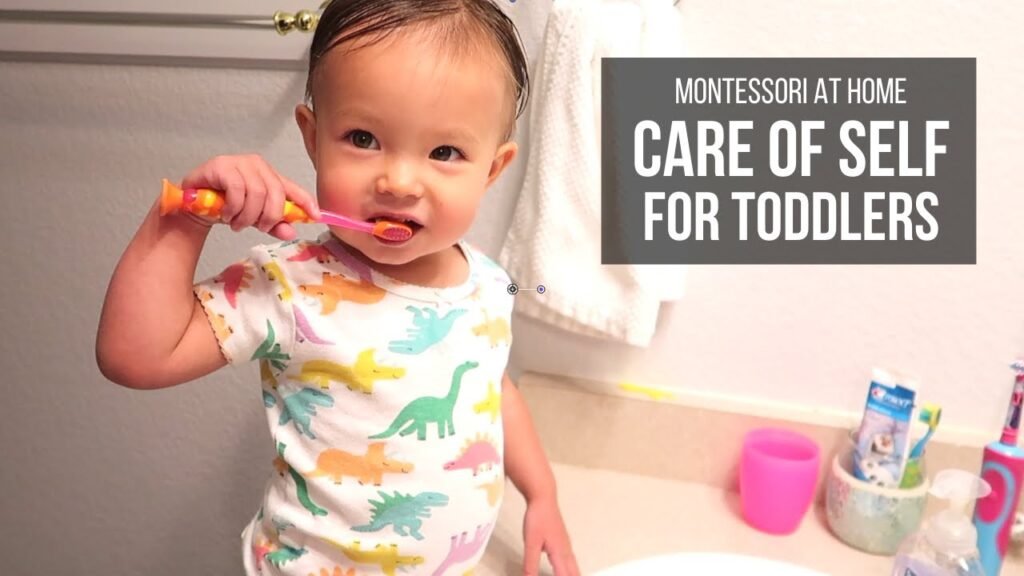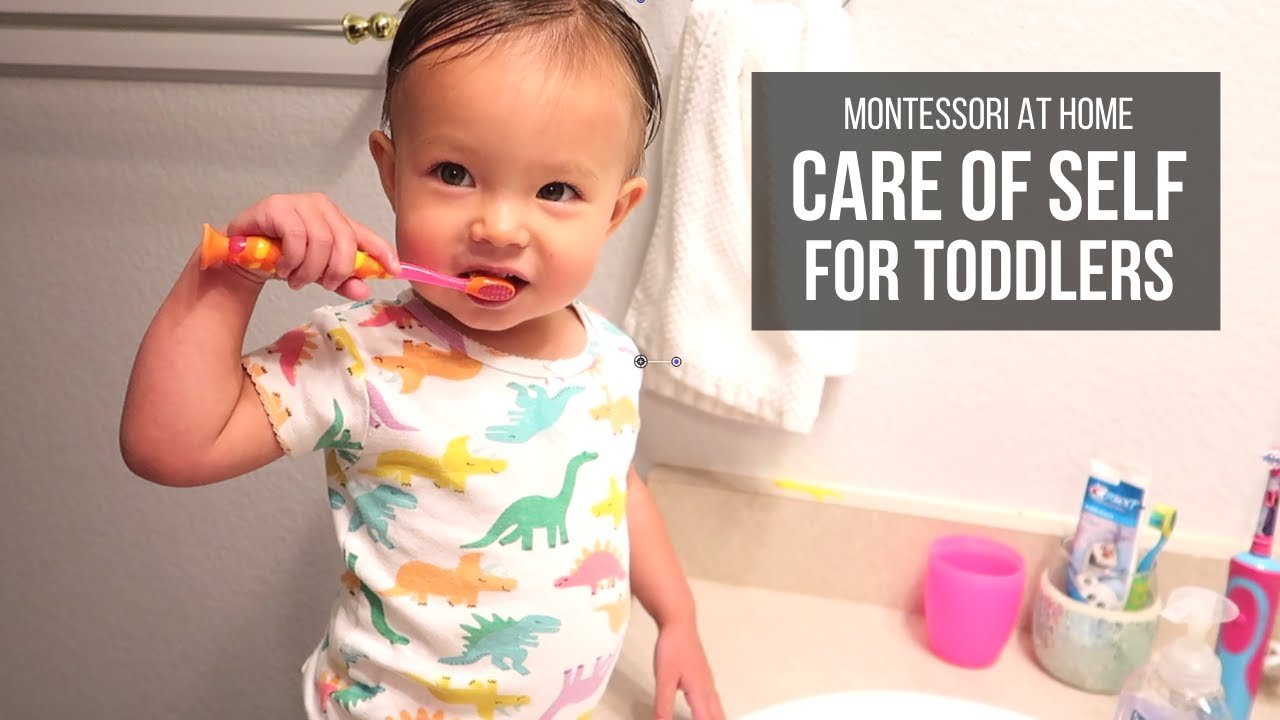Hi there! In this video by Hapa Family, you’ll learn all about encouraging self-care skills in a Montessori home, specifically focusing on toddlers. From toddler dressing to hand washing and teeth brushing, Ashley shares her personal experiences with her own children, Kylie and Mia, in relation to these self-care skills. By setting up your child’s environment for independence and providing choices, you can help your child develop confidence and independence in their self-care routine.
Ashley also offers practical tips like turning your child around when getting them dressed and introducing rhymes or songs to make the process more fun and engaging. By giving your child the independence and empowerment to choose their clothing each day, you can help them build essential life skills and foster their sense of confidence. So grab your child’s favorite outfit, put on a catchy rhyme, and let’s encourage those self-care skills in a Montessori home together!
Preparing the Environment for Independence
When it comes to fostering independence in children, the environment plays a crucial role. In the bedroom, creating a child-friendly setup is essential. Having a child-sized wardrobe or a low clothing rod at their eye level can make it easier for them to access their clothing items independently. By organizing their clothes, shoes, and other accessories in a way that allows them to see and choose what they need, you are giving them the opportunity to become more self-reliant.
Arranging clothing items at your child’s eye level is another important aspect of preparing the environment for independence. By placing clothes on hooks or using child-sized hangers in the closet, you are making it easier for your child to reach and choose their outfits. This simple adjustment can empower them to take charge of their dressing routines and build their confidence in making decisions for themselves.
Using low hooks or child-sized hangers in the closet is a practical way to encourage independence in dressing. By providing easy access to their clothes, your child can start learning how to select and put on their outfits without constant assistance. This setup not only promotes self-sufficiency but also instills a sense of ownership and responsibility in caring for their belongings.
Encouraging Independence in Dressing
Giving children choices in their clothing selection is a fundamental part of fostering independence. By offering them two acceptable options each day, you are allowing them to make decisions and express their preferences. This simple act of choice empowers children and encourages them to take an active role in their daily routines.
Teaching simple clothing rhymes can be a fun and effective way to guide children through the dressing process. Rhymes or songs that correspond to the steps of getting dressed can help children remember the sequence of putting on different clothing items. By incorporating these rhymes into their dressing routine, children can develop a sense of confidence and accomplishment as they dress themselves.
Allowing time for children to dress independently is essential in promoting self-care skills. While it may be quicker and easier to dress your child yourself, giving them the opportunity to practice and improve their dressing skills is beneficial in the long run. By allowing them to take their time and make mistakes, you are fostering a sense of autonomy and self-reliance in their daily routines.

Fostering Handwashing Skills
Creating an accessible handwashing area is key to fostering handwashing skills in children. Placing a stool or step up sink for little ones to reach the faucet and soap can make the process more manageable for them. By designing a handwashing area that is within their reach, you are enabling children to take charge of their personal hygiene.
Providing child-friendly soap and towels can make handwashing more engaging for children. Choosing colorful and pleasantly scented soap can capture their attention and motivate them to wash their hands thoroughly. Similarly, using soft and colorful towels can make the drying process enjoyable for kids, encouraging them to complete the handwashing routine with enthusiasm.
Demonstrating proper handwashing technique is essential for children to learn and adopt good hygiene practices. By showing them how to lather their hands, scrub thoroughly, and rinse properly, you are instilling healthy habits that will benefit them in the long term. Taking the time to model and explain handwashing steps can help children understand the importance of cleanliness and develop lifelong hygiene skills.
Teaching Teeth Brushing Techniques
Introducing toothbrushing as part of the daily routine is crucial for teaching children proper oral hygiene habits. By incorporating teeth brushing into their morning and bedtime routines, you are making it a consistent and essential part of their self-care regimen. Starting early will help children establish good brushing habits that will last a lifetime.
Using positive reinforcement for good brushing habits can motivate children to take responsibility for their oral health. Praising them for brushing thoroughly, using gentle and encouraging language, or providing small rewards can reinforce positive behaviors and encourage them to continue with their brushing routine. By acknowledging their efforts and progress, you are reinforcing the importance of maintaining good oral hygiene.
Gradually transitioning to fluoride toothpaste is a critical step in teaching children proper teeth brushing techniques. As they grow older and develop better coordination, introducing fluoride toothpaste can help protect their teeth from cavities and promote overall dental health. Starting with a small amount and gradually increasing the dose can ensure that children are using fluoride toothpaste safely and effectively.
Sharing Personal Experiences
Reflecting on challenges and successes with your own children can provide valuable insights for parents. By sharing personal experiences related to teaching self-care skills, you can offer practical tips and encouragement to other parents facing similar challenges. Highlighting both the struggles and achievements can help create a sense of solidarity and support among parents striving to promote independence in their children.
Emphasizing the importance of patience in teaching self-care skills is crucial for parents. Children learn at their own pace, and it’s essential to offer patience and understanding throughout the learning process. By acknowledging that mistakes are part of the learning journey and embracing the incremental progress children make, parents can create a positive and nurturing environment for fostering independence.
Consistency and positive reinforcement are key elements in promoting self-care skills in children. By establishing a routine and consistently modeling and guiding children through self-care practices, parents can help reinforce good habits. Using positive reinforcement, such as praise, rewards, or encouragement, can motivate children to continue practicing self-care skills and build their confidence in taking care of themselves.
Recommendations for Further Learning
Suggesting Montessori books on self-care for children can provide parents with additional resources and strategies for promoting independence. Books that focus on self-care skills, dressing routines, hygiene practices, and other essential life skills can offer valuable guidance and inspiration for parents seeking to incorporate Montessori principles at home. By exploring a variety of resources, parents can discover new approaches and techniques to support their child’s development.
Listing recommended audiovisual resources for parents can offer additional support and guidance in implementing Montessori practices at home. Videos, podcasts, and online tutorials that focus on self-care skills, child development, and Montessori education can provide valuable insights and practical tips for parents. By exploring different forms of media, parents can gain a deeper understanding of Montessori concepts and learn effective strategies for fostering independence in their children.
Promoting online courses for implementing Montessori at home can be a valuable resource for parents looking to expand their knowledge and skills. Enrolling in online courses that focus on Montessori principles, child development, and self-care skills can provide parents with in-depth training and practical tools for supporting their children’s independence. By investing in further learning opportunities, parents can enhance their ability to create a nurturing and empowering environment for their children’s self-care development.
Engaging with Montessori Community
Encouraging viewers to subscribe for more Montessori content can help parents stay informed and inspired on their journey of promoting independence. Subscribing to channels, newsletters, or online communities that focus on Montessori education, parenting tips, and child development can provide ongoing support and resources for parents. By connecting with a community of like-minded individuals, parents can share experiences, exchange ideas, and receive encouragement and guidance in implementing Montessori principles at home.
Welcoming feedback and suggestions for future topics can help create a dynamic and responsive online community for parents practicing Montessori. By actively seeking input from viewers, content creators can tailor their videos and resources to address specific needs and interests of their audience. Engaging with feedback and suggestions from parents can foster collaboration, communication, and a sense of community among individuals striving to promote independence and self-care skills in their children.
Creating a supportive online community for parents practicing Montessori can provide a valuable forum for sharing ideas, resources, and experiences. Establishing a virtual space where parents can connect, collaborate, and support each other in implementing Montessori principles at home can foster a sense of unity and camaraderie. By building a supportive network of parents dedicated to promoting independence and self-care in their children, individuals can access encouragement, inspiration, and practical tips to enhance their parenting journey.
Conclusion
In conclusion, fostering self-care skills in children is a critical aspect of their development and well-being. By preparing the environment for independence, encouraging choice and autonomy, and teaching essential self-care routines, parents can empower their children to become more self-reliant and confident individuals. Implementing Montessori principles at home can have a positive impact on children’s independence and overall growth, while creating a nurturing and supportive environment for their development. By emphasizing the importance of consistency, patience, and positive reinforcement, parents can play a significant role in promoting self-care skills in their children’s daily routines. I encourage all parents to continue promoting self-care in their children’s lives and to embrace the transformative power of Montessori principles in fostering independence and well-being.

